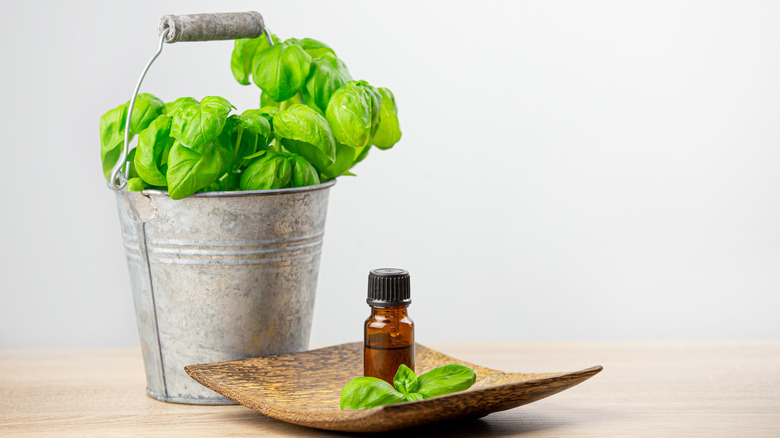The Fragrant Herb You'll Want To Have On Hand If You Have An Ant Issue
While the dynamic nature of ants and their integral role in the ecosystem cannot be denied, their tendency to infiltrate your home and garden can often prove irksome. Once they decide to establish a colony, these determined creatures can disrupt the harmony of your outdoor sanctuary and even invade your indoor spaces. So, how can you gently persuade these unwelcome guests to stay at bay? The answer lies in your garden itself — in the form of fragrant, potent herbs, like basil. Yes, you read that right. As appealing as they might be to our senses and palates, basil acts as a natural plant-based deterrent to ants.
Ants are incredibly reliant on their sense of smell, which they use for communication and navigation. They mainly use chemical signals called pheromones that they pick up with their antennae. This method of communication plays such a pivotal role in their lifestyle, and any interference can greatly affect how they behave and work. When the strong aroma of basil suffuses into the air, it floods the ants' olfactory receptors, prompting a form of sensory bewilderment. This results in what can be aptly described as a smokescreen — a potent atmospheric concoction that can mask or override the pheromones laid down by other ants. This disruption can effectively discourage them from entering your garden and might make those already present more likely to leave.
How to use basil to deter ants
Integrating basil into your garden and home involves a two-pronged approach: in-garden planting and in-house application. Both are relatively straightforward and effective. When placing basil in the garden, begin by assessing the areas where ants frequent. Identify pathways where these pests may be invading and strategically intersperse the plant in these spots to create a fragrant blockade. You don't need to overcrowd the area; simply space your basil plants about a foot apart to ensure each plant has enough room to thrive and adequately deter ants. Also, keep in mind that basil thrives best in the sunniest spots of your garden and yard. Most importantly, try to water the basil regularly and prune them when they become too bushy, as this promotes a steady release of their natural aroma.
Within your home, basil can be used in various ways. Fresh or dried leaves of these herbs can be placed in areas where you've seen ants. If you're seeking a more potent formulation, you can add some essential oils to repel the ants. Start by adding a few drops of basil oil to a spray bottle filled with water, then spray the mixture onto cotton balls and place it by your doors or cracks where ants are getting in. Alternatively, you can directly apply it to areas infested with ants, such as windowsills, doorways, and any other potential ant entrances.

